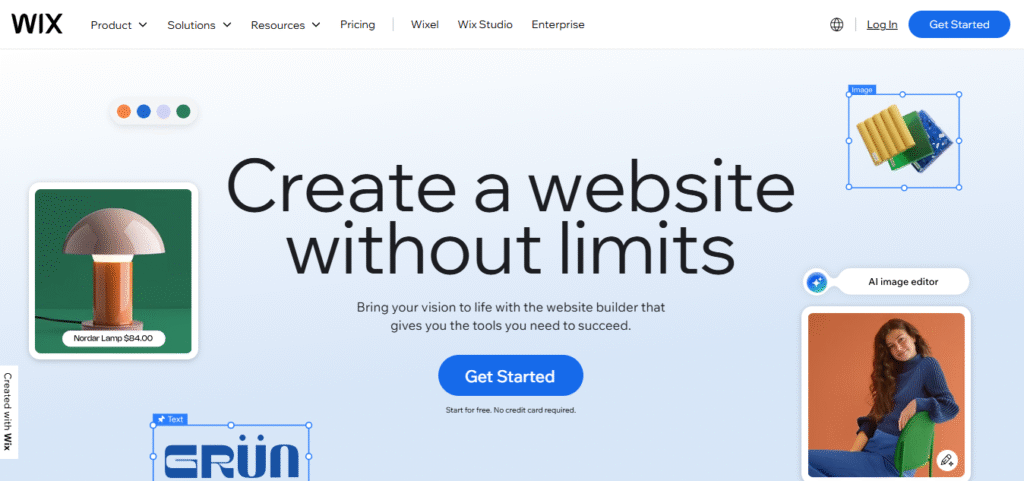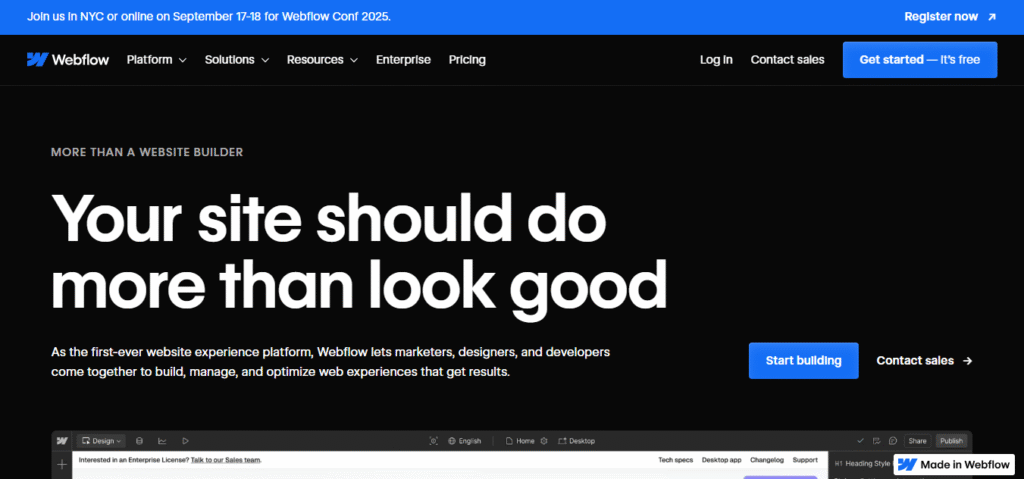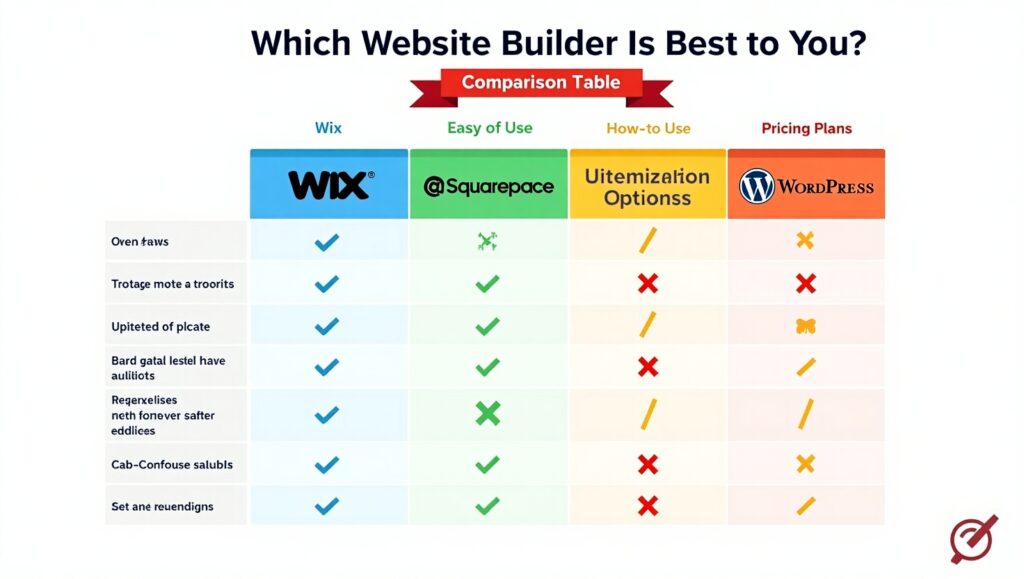
Introduction
Although affiliate marketing is among the leading methods for online income generation, it requires more than strong content since the proper platform is essential for success. Your website functions as your storefront, and selecting the appropriate website builder for affiliate marketing affects your earnings potential, along with your SEO standing and user experience. This guide assists beginners and existing businesses select the optimal platform for their affiliate marketing needs.
This article evaluates five leading website builders designed for affiliate marketing professionals. Our analysis will cover each platform’s features while assessing their user-friendliness alongside customization potential and scalability capability, as well as integration support and compatibility with affiliate marketing. By the end, you’ll be able to answer the question: Which website builder stands out as the top choice for building affiliate marketing platforms?
Selecting the appropriate website builder plays a critical role in your affiliate marketing success.
Different website builders offer varying levels of functionality and features, which have become critical when you’re building an affiliate marketing site. Selecting the wrong platform will put constraints on your customization options and damage your SEO while also disappointing your visitors. The correct platform allows you to concentrate on expanding your business operations while developing consumer trust and earning affiliate income.

Key Features to Look For:
- Built-in SEO Tools
- Responsive Design for all devices
- Affiliate Link Management and Cloaking
- Customizable Templates that align with your niche
- Fast Load Times to reduce bounce rate
- Blog Functionality to publish content consistently
- Landing Page Builders to support campaigns
- Analytics and Insights to track performance
Benefits of the Right Builder:
- Higher conversion rates from optimized pages
- Better content management with flexible platforms
- Enhanced SEO to attract organic traffic
- Improved site security and consistent uptime
- Your affiliate business can expand with a scalable architecture.
Pro Tip:
The ideal website builder should enable you to prioritize content creation and marketing activities rather than coding.
Squarespace: Squarespace offers the best website-building options for new affiliate marketers.
Beginners who wish to create attractive affiliate websites without technical expertise choose Squarespace because of its beautiful templates and user-friendly interface.

Why It Stands Out:
- Elegant templates that display affiliate products and blog content in an organized manner
- The platform includes a blogging tool that enables detailed reviews and comprehensive guides.
- All templates are mobile-responsive and performance-optimized
- Intuitive editor with real-time preview
Pros and Cons:
- Pros:
- Drag-and-drop interface with no learning curve
- Excellent for design-focused niches (lifestyle, fashion, travel)
- Comprehensive security and SSL included
- Dependable 24/7 support
- Cons:
- Fewer third-party app integrations than WordPress
- Not suitable for highly customized functionality
- No free version (only a 14-day trial)
Best For:
- Beginners
- Bloggers and visual storytellers
- Creatives in visual-centric affiliate niches
Case Study:
Moving from Blogger to Squarespace enabled Lisa who b, who blogs about fashion, to experience a 70% surge in visiting users’ time on her website. She doubled her affiliate revenue during six months through the use of stylish layouts and persuasive calls to action.
Wix: An effective website-building platform designed specifically for affiliate marketers
The Wix platform serves both novice users and professionals with its flexible design features. The combination of its user-friendly interface and diverse toolset makes Wix an excellent platform for constructing affiliate websites that deliver both functionality and visual appeal.

Standout Features:
- Over 800 professionally designed templates
- The Wix ADI feature enables users to generate web pages automatically using Artificial Design Intelligence.
- The platform offers a vast App Market for implementing forms as well as affiliate tools and widgets.
- Seamless blogging integration and newsletter management
- Built-in SEO Wizard for on-page optimization
Use Case:
Jane established a specialized electronics comparison blog that targets tech product reviewers. She achieved a 60% increase in organic traffic and higher conversion rates through the strategic application of Wix SEO features and integrated review plugins.
Pros:
- User-friendly design system
- Great balance between customization and convenience
- E-commerce-ready for affiliate-to-product-store transitions
- Built-in automation workflows (email, CRM, analytics)
Cons:
- Too many features may overwhelm new users.
- Slightly slower performance on complex websites
Ideal For:
- Marketers who need full design control but lack coding expertise
- Affiliate websites require both review modules and custom landing page solutions.
WordPress: Which Website Builder Should Affiliate Marketing Experts Use?
Advanced affiliate marketers benefit from the unmatched flexibility and functionality provided by WordPress when integrated with page builders such as Elementor or Divi. Professionals choose this platform because it allows them complete authority over their website structure and monetization features, along with plugin management.

Why It Dominates:
- Fully customizable from design to backend
- Compatible with thousands of affiliate marketing plugins
- Large community and developer support
- This platform provides high scalability to support expanding affiliate networks or product funnels.
Best Plugins for Affiliate Marketing:
- ThirstyAffiliates – Link cloaking and advanced tracking
- Pretty Links – Simplifies URL management and redirection
- AffiliateWP – This delivers a powerful platform to manage your affiliate program effectively.
- RankMath – Provides advanced SEO capabilities.
- WP Product Review – Allows users to add structured reviews as well as comparison boxes to their website.
Pros:
- You own your content and website entirely.
- You have total control over your website, which allows you to adjust layout features, improve performance metrics, and maximize monetization potential.
- Compatible with all affiliate networks and tools
Cons:
- Users need technical skills or a developer to proceed.
- It can be overwhelming for first-time users.
Ideal For:
- Experienced affiliate marketers and SEOs
- Long-term business builders
- Users who need complete authority over their branding and website performance
Pro Tip:
A fast hosting provider, including SiteGround, WP Engine, or Bluehost, enhances WordPress performance with improved speed and reliability.
Weebly: An Easy-to-Use Website Solution for Affiliate Success
Weebly provides affiliate marketers with a straightforward tool for website creation that delivers basic yet effective results. This platform serves as an excellent starting point for newcomers testing affiliate marketing or individuals managing side projects.

Features Overview:
- Basic blogging platform with customizable layouts
- Weebly provides SEO features, including meta tags, alt text for images, and detailed website sitemaps.
- Forms and CTA buttons integrated into templates
- Free and paid plans are available.
Pros:
- Drag-and-drop interface that’s beginner-friendly
- Includes free hosting and domain setup
- Simple blogs and affiliate websites receive suitable toolsets for effective management and maintenance.
Cons:
- Limited design and template options
- Lacks advanced plugins and integration capabilities
- Not the best option for long-term scaling
Best For:
- Entry-level affiliate marketers
- Budget-conscious users
- Simple, content-driven affiliate blogs
Case Study:
Tom created a niche website that specializes in supplement reviews as a personal trainer. Through Weebly’s blog and newsletter functionality he get, he generated constant Facebook ad traffic, which resulted in $500/month affiliate income during his first four months.
Webflow: What Website Builder Should Affiliate Marketing Professionals Use?
Webflow provides design flexibility alongside features for content management commonly associated with content management systems. Professional marketers and agencies who build exact affiliate sites emphasizing branding and performance will find this platform ideal.

What Sets It Apart:
- Code-level control without needing to write code
- Offers integration capabilities with Zapier as well as Google Analytics and multiple additional tools.
- This advanced CMS provides effective management solutions for blog content alongside affiliate reviews and product collections.
- Custom animations and dynamic content deliver superior performance improvements.
Pros:
- Superior customization and design accuracy
- Fast-loading, SEO-optimized pages
- Scalable content architecture
Cons:
- The steep learning curve for new users
- Expensive compared to entry-level platforms
Best For:
- Designers and marketers need high-end visuals.
- Agencies and freelancers building multiple affiliate sites

Comparison Table: Which Website Builder Is Best for You?
| Website Builder | Ease of Use | SEO Tools | Customization | Affiliate Plugins | Best For |
| Squarespace | 5/5 | Basic | Moderate | Limited | Beginners |
| Wix | 4.5/5 | Good | High | Moderate | All Levels |
| WordPress | 3.5/5 | Excellent | Very High | Extensive | Experts |
| Weebly | 4/5 | Basic | Low | Limited | Newbies |
| Webflow | 3/5 | Very Good | Very High | Limited | Pros & Designers |
Final Thoughts: Which Website Builder Delivers Maximum Results for Affiliate Marketing?
The appropriate website builder for your affiliate marketing venture varies based on your expertise, chosen niche, and future aspirations. Before picking a platform, take into account your objectives along with your technical expertise and financial resources.

Quick Recap:
- Beginner users find the Squarespace platform both stylish and easy to navigate for their website development needs.
- Wix – Great for flexibility and marketing features
- WordPress delivers superior capabilities for scalability and complete website management.
- Weebly provides the easiest path to create an affiliate marketing site.
- Webflow – Professional-grade builder for pixel-perfect sites
“Your website builder serves as the essential base upon which your affiliate business is built. Make smart choices in your building approach to achieve future success.”
Next Steps:
- Explore each platform through free trials or demo sign-ups
- Develop your affiliate marketing approach alongside your content planning strategy.
- Select a platform that meets both your technical abilities and your audience’s expectations.
Selecting the correct website builder allows you to establish an affiliate site full of valuable content, which generates increasing revenue as time passes.

